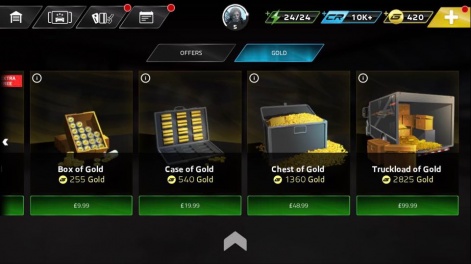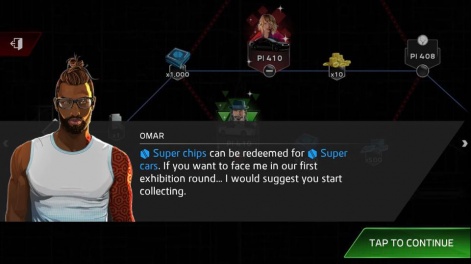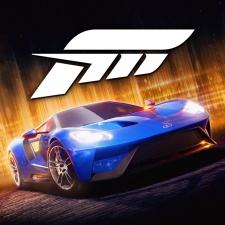Welcome to The In-App Purchase Inspector– our regular look at free-to-play mobile game monetisation from the consumer's perspective.
In each instalment, we consider how well a developer has designed its in-app purchase retailing to work alongside the overall gameplay and metagame experience.
This time we're looking at Microsoft's free-to-play street racer Forza Street.
Pedal to the metal
The Forza brand launched originally in May 2005 and ever since has predominately been handled by US firm Turn 10 Studios and Playground Games (both divisions of Microsoft Studios).
However, for Forza's mobile debut, the bulk of development was passed on to Brighton indie Electric Square - best known for its work on Hot Wheels id, a mobile racer that merged physical and digital in a "Mixed Play" experience.
Set in Miami, Forza Street immediately hits you with its bright lights, flashy cars and inventive camera angles, the likes of which are normally reserved for Hollywood blockbusters. The way it presents itself on opening makes you believe the title will be more akin to the open-world environment of the Horizon series.
In fact, once the tutorial is complete, the realisation sets in that it's actually a much more stripped-down version of the beloved series and closer to competitor Need for Speed than ever before. Most notable is the absence of city exploration, with players instead tapping a menu that leads you from race-to-race.
It's a somewhat surprising move considering the original developer's clear passion for open-world driving games, something that has become a staple of the series and has helped boost entries in the Horizon series to huge levels of hysteria every time a new one is announced. Not to mention lifetime sales clearing $1 billion.
Previously, we've had the pleasure of exploring Australia, France, Italy, Colorado, and the UK, so many were understandably hoping that Miami would follow in its slipstream. Alas, this is not the case.
The racing mechanic itself is actually rather enjoyable, albeit heavily simplified. Players have access to two components: a pedal, and a boost meter that gradually fills up over time. The aim is to simply keep your finger down on the acceleration button before letting go in and out of corners while using the nitro-fuelled boost as you see fit.
Nickels and dimes
There's a loose story about rising through the ranks to become champion across multiple episodes containing several "parts", all with multiple events to complete.
Additionally, there is a variety of in-game currency: Gold for purchasing cars, Credits for improving the vehicles, and Energy for competing in races. There are also Car Cards that separate out into numerous subsidiaries which are unnecessarily confusing. In other words, there's a lot of content here.

Once enough of these Car Cards are collected, vehicles can be unlocked via a roulette wheel that early on will give drivers access to cars worth two to three stars out of of a possible five. Players are gifted a one-star beginner vehicle on arrival, alongside a three-star Ford GT for downloading the game in its infancy.
Progressing through part one of the narrative yields plenty of rewards to advance and no microtransactions - only after completion does everything change.
From the jaws of victory
It was a heated race. Thrilling some may even say. Going down to the wire, with a photo finish to perfectly cap off a tough contest.
Sadly, instead of being greeted with a trophy screen or some sort of celebration for completing the first segment, Forza Street decided to offer a £4.99 'Accelerator Pack'. The offer is reasonable and quite generous for a starter pack (four Class Cars across each of the games' classes, Exhaust Parts, Tuning and Credits) but the timing felt completely wrong and broke the immersion.

On top of this, there are a number of daily login bonuses and challenges to complete, with Electric Square seemingly opting to entice people for the long-term. A big part of this is car delivery - for a number of them to be unlocked, players must return 24 hours before being given the keys.
In the short-term, players will have plenty of options without the need to pay for extras. Though for those looking to obtain anything top-tier or wanting to progress through the story without interruption, they will find it an increasing struggle without dipping into their wallets.
All races can be challenged in Easy, Medium or Hard difficulty with the latter reaping more rewards, including Tuning Kits, Car Cards and Super Chips. The majority of the rewards earned were poured into one particular car of mine, a 1970 Dodge Challenger R/T.

Still, races became instantly tougher after part one, with Easy being the only viable option to have any chance of moving forward. This indicates a grinding manoeuvre put in place to slow the player down from progressing through the full story and never returning.
Since launching on May 5th, 2020 (though pre-downloads began earlier), Forza Street has accumulated two million installs and over $500,000 in revenue, according to Sensor Tower data. Not a bad haul, but for an established IP, there's definitely room for improvement.
The upcoming months will be pivotal on whether the long-term mechanics put in place prove successful for the developers. From a player perspective, it will also be interesting to see whether those committed will unlock the car of their dreams, or if the whole ordeal will continue as another spin of the wheel.























